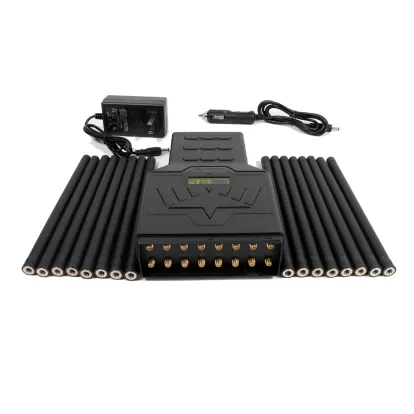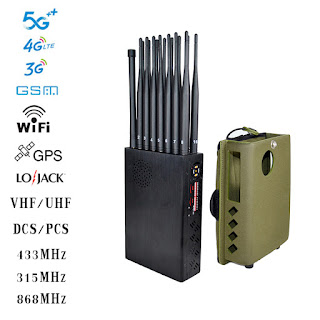Does cellphone signal jamming offer a viable solution to the pervasive problems of drugs and violence in prisons?
The newly appointed attorney general of Oklahoma, alongside other esteemed prosecutors across the country, is urging Congress to enact a law that would permit the jamming signal of cellphone within state prisons.

Attorney General Gentner Drummond emphasized the fact that criminal enterprises can operate within prison walls. He stressed the importance of equipping law enforcement with the necessary tools to address this issue promptly, urging Congress to take swift action.
Drummond joined 21 other attorneys general last week in a letter urging Congress to pass ''meaningful" legislation allowing states to jam cellphones at prisons.
The prosecutors informed congressional leaders on Wednesday that inmates employ illicit cell phones to orchestrate acts of murder, riots, drug transactions, fraud, and various other illicit activities. Presently, these cell phones continue to be utilized without any means to impede their usage, thereby constituting a significant menace to public safety.
Cellphones used to direct drug rings from inside prisons, DOJ says
The recent call for a modification in the legislation arises following the release of statistics by the U.S. Department of Justice, shedding light on the gravity of the situation in Oklahoma.
According to a news release issued on Friday, the U.S. attorney from Oklahoma City revealed that state inmates associated with four different criminal organizations were able to acquire unauthorized cell phones while being imprisoned. This allowed them to effectively oversee their drug trafficking and violent networks by communicating with their associates outside the confines of the prison.
“Now, 275 dangerous criminals have been held accountable, more than a half-ton of poisonous drugs and 393 firearms have been removed from the streets, and $1.3 million in cash has been taken away from drug traffickers," U.S. Attorney Bob Troester said about the results of the drug prosecutions.
As stated in the news release, a total of thirty offenders were incarcerated for their involvement in drug rings. These individuals were found to be directing the operations, which were often characterized by violence, through the use of smuggled cellphones.
Sentenced in December was Eduardo Rosales, a leader of a ring operated by the Southside Locos gang that distributed methamphetamine from Mexico across the state in 2019. Rosales, 37, of Oklahoma City, was already in state prison at the time for drug offenses.
Chance Alan "Wolfhead" Wilson, who was convicted for the murder of his sister, was also sentenced in December. While serving time in state prison, Wilson operated a drug ring. Federal prosecutors have identified Wilson, a 38-year-old resident of Purcell, as a prominent figure in the Universal Aryan Brotherhood, a prison gang.
They were both sentenced to a 30-year term of imprisonment in a federal facility.
Thousands of cellphones seized from Oklahoma facilities
The Oklahoma Department of Corrections reported on Friday that a total of 5,247 mobile phones were confiscated in both state-run and privately operated correctional facilities last year.
"Despite the presence of cellphone-detecting K-9 units and nonstop intelligence-gathering efforts, some phones still manage to get through. That is a reality faced at all levels, from county jails to federal prisons," said Josh Ward, chief of communications.
Court records indicate that guards have illicitly introduced cellphones into Oklahoma prisons. Additionally, these devices have been either hurled over prison fences or delivered via drones.
Oklahoma authorities have urged for innovative strategies to tackle the issue of illicit cellphones.
Governor Kevin Stitt, in 2019, stressed the importance of finding a technological remedy to tackle the issue at hand. This statement was made following a string of gang-related conflicts in six prisons, which subsequently led to the imposition of lockdowns.
The governor's office has reported that the use of contraband cellphones by inmates enabled the occurrence of the "premeditated acts of violence".
In that particular year, Senator James Lankford from the United States advocated for the authorization of jamming wifi technology usage by states.
“Why don't we change that law?” Lankford asked on the Senate floor. “Great question. A question that should have been answered by this body a long time ago, but communications companies and cellphone company lobbyists overwhelmed this body and pushed back and say, ‘Let's study the issue.’”
He said he repeatedly met with leaders at the Federal Communications Commission in an effort to resolve the issue. "Each year ... they say, 'We're studying it.'"
FCC opposes cellphone jamming, citing safety concerns
The Federal Communications Commission (FCC) has maintained a steadfast stance against the implementation of jamming technology within state prisons for an extended period of time.
The FCC has expressed that it brings about a greater number of complications than it resolves. Additionally, it has the capability to disrupt mobile 911 calls and public safety communication.
In August, Lankford lent his support as a cosponsor to the Cellphone Jamming Reform Act, which, regrettably, failed to secure a vote and subsequently ceased to exist.
Last week, Lankford tweeted that it is imperative for states to possess the authority to jam signals.
The Federal Communications Commission (FCC) devised a method in 2021 that enables designated prison officials to seek the cooperation of wireless providers in disabling cell signals, one at a time, without the requirement of a court order.


Comments
Post a Comment